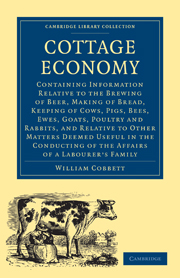Book contents
- Frontmatter
- Contents
- 1 Introduction. To the Labouring Classes of this Kingdom.—Brewing Beer
- 2 Brewing Beer continued
- 3 Making Bread
- 4 Making Bread continued.—Brewing Beer.—Keeping Cows
- 5 Keeping Cows
- 6 Keeping Pigs.—Salting Mutton and Beef
- 7 Bees, Geese, Ducks, Turkeys, Fowls, Pigeons, Rabbits, Goats and Ewes, Candles and Rushes, Mustard. Dress and Household Goods and Fuel, Hops and Yeast
- INDEX
7 - Bees, Geese, Ducks, Turkeys, Fowls, Pigeons, Rabbits, Goats and Ewes, Candles and Rushes, Mustard. Dress and Household Goods and Fuel, Hops and Yeast
Published online by Cambridge University Press: 29 August 2010
- Frontmatter
- Contents
- 1 Introduction. To the Labouring Classes of this Kingdom.—Brewing Beer
- 2 Brewing Beer continued
- 3 Making Bread
- 4 Making Bread continued.—Brewing Beer.—Keeping Cows
- 5 Keeping Cows
- 6 Keeping Pigs.—Salting Mutton and Beef
- 7 Bees, Geese, Ducks, Turkeys, Fowls, Pigeons, Rabbits, Goats and Ewes, Candles and Rushes, Mustard. Dress and Household Goods and Fuel, Hops and Yeast
- INDEX
Summary
159. I NOW proceed to treat of objects of less importance than the foregoing, but still such as may be worthy of great attention. If all of them cannot be expected to come within the scope of the care of a labourer's family, some of them must, and others may and, it is always of great consequence, that children be brought up to set a just value upon all useful things, and especially upon all living things; to know the utility of them : for, without this, they never, when grown up, are worthy of being entrusted with the care of them. One of the greatest, and, perhaps, the very commonest, fault of servants, is, their inadequate care of animals committed to their charge. It is a wellknown saying, that “the master's eye makes the horse fat;” and the remissness, to which this alludes, is generally owing to the servant not having been brough up to feel an interest in the well-being of animals.
BEES.
160. It is not my intention to enter into a history of this insect, about which so much has been written, especially by the frivolous French naturalists. It is the useful that I shall treat of, and that is done in not many words. The best hives are those made of clean, unblighted rye-straw.
- Type
- Chapter
- Information
- Cottage Economy , pp. 143 - 182Publisher: Cambridge University PressPrint publication year: 2009First published in: 1822



